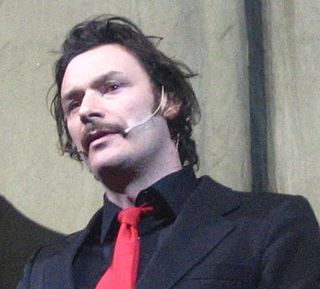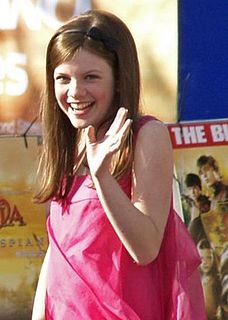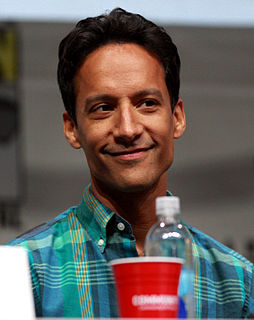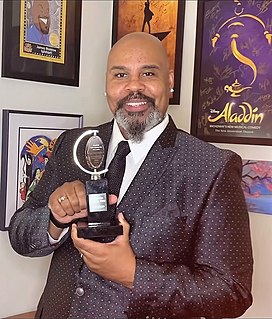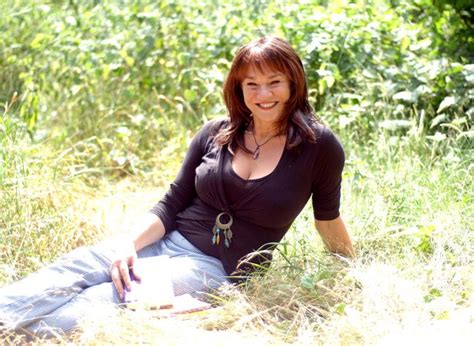A Quote by Garrison Keillor
A boy wrote me once to say that he loved it when the news from Lake Wobegon came on the radio because it meant that his parents stopped arguing. That was an eye-opener for me. You work hard to polish your act and then you find out that it does people good in ways you couldn't predict.
Related Quotes
I can act with either eye, but you've got to be twice as good as an actor to act with one eye. You need to put all your emotions just through one eye and really punch it out of that eye. I found it quite difficult to do at first, and then I found a technique that allowed me to act with one eye, which I patented.
Once a little boy sent me a charming card with a little drawing on it. I loved it. I answer all my children’s letters — sometimes very hastily — but this one I lingered over. I sent him a card and I drew a picture of a Wild Thing on it. I wrote, “Dear Jim: I loved your card.” Then I got a letter back from his mother and she said, “Jim loved your card so much he ate it.” That to me was one of the highest compliments I’ve ever received. He didn’t care that it was an original Maurice Sendak drawing or anything. He saw it, he loved it, he ate it.
I stopped for a second. If you remember everything, I wanted to say, and if you are really like me, then before you leave tomorrow, or when you’re just ready to shut the door of the taxi and have already said goodbye to everyone else and there’s not a thing left to say in this life, then, just this once, turn to me, even in jest, or as an afterthought, which would have meant everything to me when we were together, and, as you did back then, look me in the face, hold my gaze, and call me by your name
I find it hard to act unprofessionally because I can't do drama at school, it's hard for me to do drama out of school, I don't have time any more. I dance as well. I don't have time to work and dance and still have a good social life. I miss that security but I'm hoping that this is a good time for me. I'm trying to do as much as possible to get myself out there and hopefully it will work out.
I wrote 'Turn Your Radio On' in 1937, and it was published in 1938. At this time radio was relatively new to the rural people, especially gospel music programs. I had become alert to the necessity of creating song titles, themes, and plots, and frequently people would call me and say, 'Turn your radio on, Albert, they're singing one of your songs on such-and-such a station.' It finally dawned on me to use their quote, 'Turn your radio on,' as a theme for a religious originated song, and this was the beginning of 'Turn Your Radio On' as we know it.
I attempt all day, at work, not to think about what lies ahead, but this costs me so much effort that there is nothing left for my work. I handle telephone calls so badly that after a while the switchboard operator refuses to connect me. So I had better say to myself, Go ahead and polish the silverware beautifully, then lay it out ready on the sideboard and be done with it. Because I polish it in my mind all day long—this is what torments me (and doesn't clean the silver).
A book came out recently written by scientists and environmentalists that made me so angry. It said the only thing we have to worry about is big industry. Each individual who tries to make his or her own environment better is useless. I find this criminal, because then you have a billion people all saying, It doesn't matter what I do because I'm just one person. But if you turn that around and a billion people say, What I do does make a difference, then it will make a difference.
I approach my life with logic. I do not act on impulse or emotion. I very seldom find that I say, 'And then I can't think what came over me, but I did this or that or the other.' I nearly always know how I will act and I nearly always act in that way. I don't catch myself out in embarrassing situations because I've acted without forethought. I calculate what I will do.
I wanted to make a movie once at Lake of the Woods, where my parents had a cabin, which I now have. We actually planned, we wrote a whole screenplay about a kind of Indian spiritual group that was at Lake of the Woods. We weren't calling it that but it was Lake of the Woods. We wrote a whole screenplay about it but we couldn't get funding for it.
I think in many ways, I'm sort of a blank canvas, because in many ways, I'm just observing the world and the people around me and their characters and letting them kind of explode off me and to find out why they're doing what they're doing. But then every once in awhile, I get to take on a whole new character.
If anyone were to find out—” I began. Patch kissed me, hard, but with an amused glint in his eye. “If I get caught, it’ll mean the end of kissing you. Do you really think I’d risk that?” His face grew serious. “I know I can’t feel your touch, but I feel your love, Nora. Inside me. It means everything to me. I wish I could feel you the same way you feel me, but I have your love. Nothing will ever outweigh that. Some people go their entire lives never feeling the emotions you’ve given me. There is no regret in that.
Television and radio are what I call sequential media; they're not simultaneous media. With simultaneous media, you can scan your eye down an electronic or print page and pick among six or seven stories you might like and want to read. With television and radio, you have to wait until the guy's finished talking about the balloon boy, which I don't have the slightest interest in, to find out that all hell's broken loose in Baghdad. Because they've chosen that day to start with the balloon boy.
I keep "leave me alone, I'm busy " pretending to work sign with me because my dad once told me to find a job that you would do for free and I would do this job for free. But I would be a performer for free because that's all I've ever loved to do. I've worked so hard to get to the point where work doesn't feel like work. So when I come to work, I'm actually coming to play - I'm coming to recess. So, when you see me, leave me alone, I'm busy ... pretending to work.

